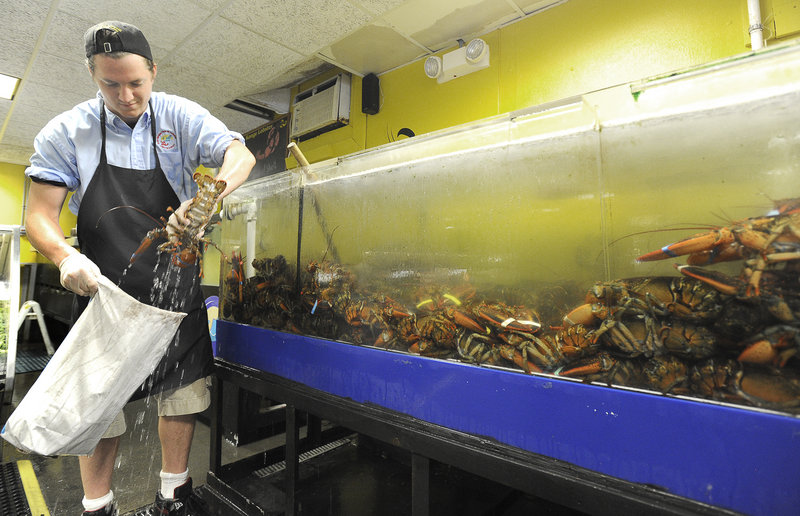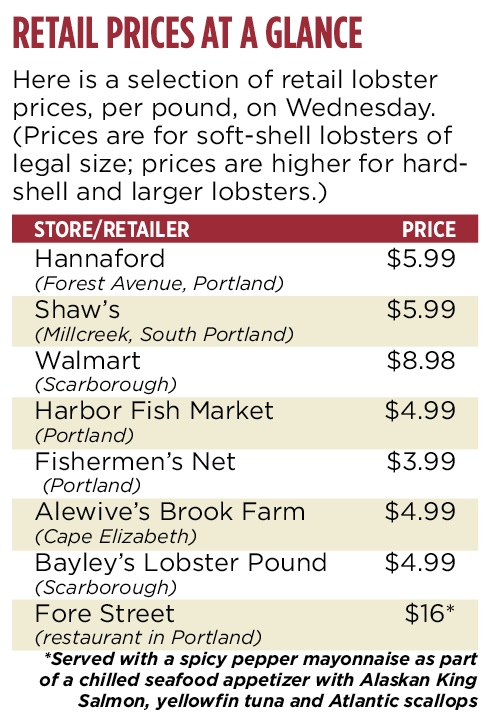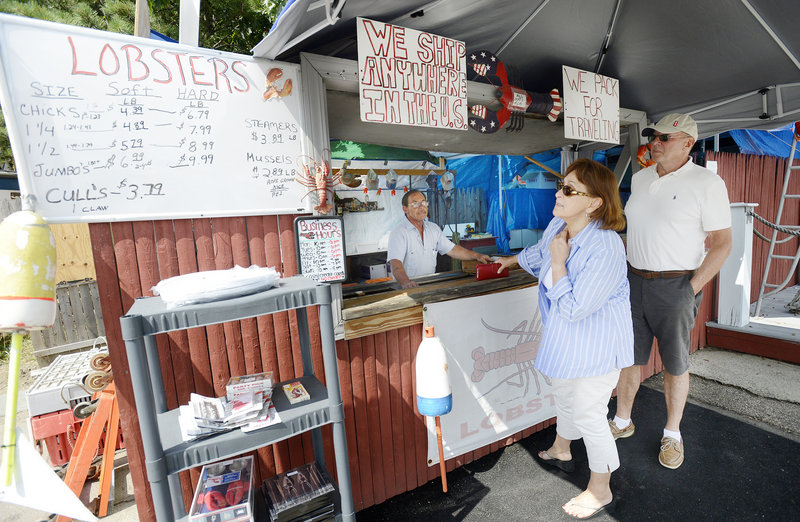By the time that lobster gets to your plate, several people have already taken a nibble.
Lobstermen, wholesale dealers and retailers all get a cut of the final price as the state’s iconic seafood moves from a trap at the bottom of the Gulf of Maine to the dock and then into a retailer’s lobster tank.
With lobstermen complaining that what they’re being paid doesn’t even cover their costs, these markups are getting attention
Retail prices over the past few weeks have generally reflected a regional glut of soft-shell lobsters — the cheapest kind because they tend to have less meat than hard-shell lobsters. Calls to several Greater Portland lobster retailers revealed a range of prices, from $3.99 a pound at Fishermen’s Net in Portland to $8.98 a pound at Walmart in Scarborough.
But lobstermen say they’re getting as little as $2 a pound dockside, although Robert Bayer, the head of the University of Maine’s Lobster Institute, said it’s probably more like $2.50 to $2.75 a pound.
Dane Somers, executive director of the Maine Lobster Promotion Council, said moving lobster from the ocean to the dinner table is pretty straightforward locally. The lobstermen sell to a wholesale dealer, who sometimes sells to a second dealer, who sells to a retailer.
People in the industry are reluctant to talk about anything other than retail prices. Wholesale dealers say they get a pretty standard cut that doesn’t change as retail prices rise and fall. Retailers say they only charge what the market will bear.
Bayer said that each dealer typically adds 50 cents a pound. The retailer’s markup is usually an additional 50 cents to $1 a pound, he said, although the prices being charged by some retailers suggest they have been adding more recently.
Given the market glut, those margins are probably less now, Bayer said.
“There’s always wiggle room if you’ve got product you want to move,” he said, especially if the product can only last a few days in a tank before it’s worthless.
Even using Bayer’s $2.75-a-pound-at-the-dock figure, lobstermen’s complaints about losing money seems to be borne out by a 2010 study of U.S. lobster pricing by Gardner Pinfold, a Canadian market research firm. That study suggested that at the time, costs such as labor, fuel, gear, bait, insurance, repairs and fees added up to more than $3.00 per pound.
Part of the problem for lobstermen, the Gardner Pinfold study found, is that the way lobsters are bought and sold is inherently flawed, and the normal law of supply and demand “fails more or less completely” when it comes to lobster.
The study said that producers — in this case, lobstermen — would normally be expected to cut back on supply as demand ebbs and prices fall. But regardless of price, “when the season starts, everyone goes fishing and fishes hard to maximize their share of the finite supply,” the study said. “Indeed, fishing may be more aggressive when prices are low to try to maintain income.”
The study also found that buyers will purchase as much as the lobstermen bring in — again, largely regardless of the going price — because otherwise, they risk losing a lobsterman’s business to another dealer.
People in the industry say they hope things will get better in a few weeks, as shells on what are now soft-shell lobsters harden and they can be shipped greater distances. That expands the market, they say, easing the glut and allowing prices to firm up.
Somers said the industry also hopes to reinvigorate demand by launching a regional advertising campaign next month and increasing next year’s marketing budget from the current $375,000 to about $3 million.
He said a bill to increase the promotion council’s surcharge on lobstermen’s and dealers’ licenses to raise more money for marketing will be introduced in the Legislature early next year.
“The only way to exercise any control over our own destiny is to invest more to increase demand,” he said. “To do nothing is no longer an option. That’s not working for us.”
Staff Writer Edward D. Murphy can be contacted at 791-6465 or at:
emurphy@pressherald.com
Copy the Story Link
Send questions/comments to the editors.






Success. Please wait for the page to reload. If the page does not reload within 5 seconds, please refresh the page.
Enter your email and password to access comments.
Hi, to comment on stories you must . This profile is in addition to your subscription and website login.
Already have a commenting profile? .
Invalid username/password.
Please check your email to confirm and complete your registration.
Only subscribers are eligible to post comments. Please subscribe or login first for digital access. Here’s why.
Use the form below to reset your password. When you've submitted your account email, we will send an email with a reset code.